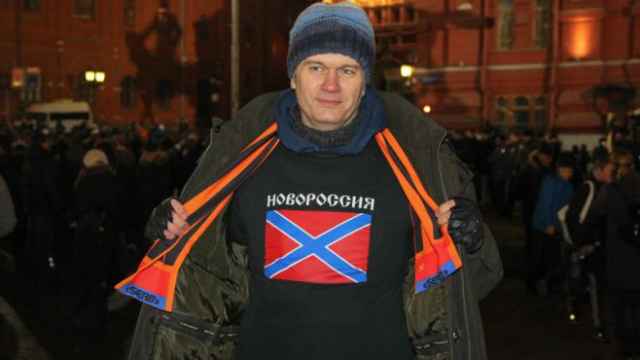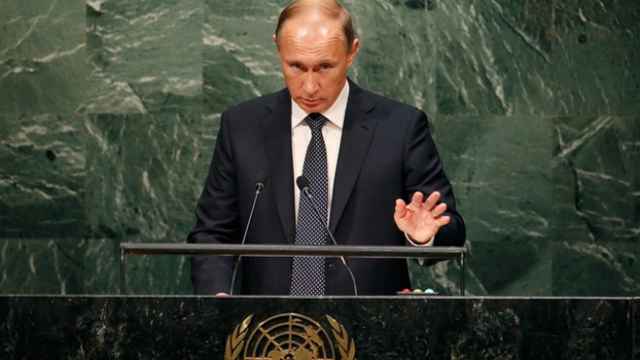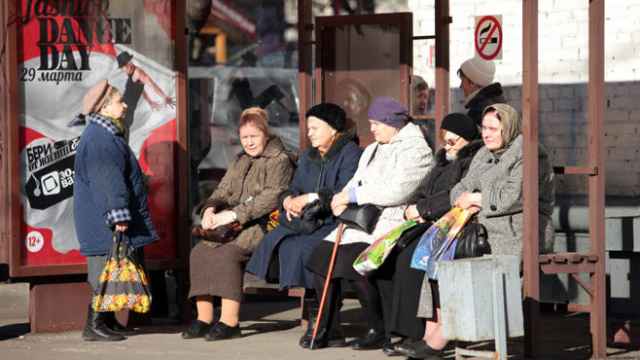Russian consumers are increasingly unhappy, but their discontent is being frozen in depression rather than manifested in social protest. A proverbial battle is being fought between the refrigerator and the television set: people's living conditions vs. state propaganda.
As we know, television is winning. Even the young woman giving the weather forecast on Russian television talks about Syria. The Russian consumer forgets that he hasn't eaten yet; his stomach fills with pride at Russia's bombing campaign, which is a substitute for missing food imports.
Angus Deaton, the British economist who was awarded this year's Nobel Prize in Economics advanced the idea that happiness is an important factor in economics. That fits with the current state of Russia: As long as one can find happiness on the television screen, one can get by with decreasing amounts of food.
Some new polling data from the independent Levada Center pollster suggests that the public is not exactly content. Seventy-seven percent of the population agrees that the country is in crisis. A total of 38 percent "absolutely agree" with that characterization — a 10-point increase since March.
A poll conducted over the summer by the Institute for Social Analysis and Forecasting (ISAF) and published in September found that 72 percent of respondents have concluded that there is a crisis. Those most likely to characterize the situation in this way are the elderly, the highly educated, and those living in industrial regions and large cities where the service sector is now beginning to decline.
But people still tend to blame the West for the crisis, rather than their own government. Thirty-four percent of Russians blame their problems on external factors. Most believe the government is doing an "average" job, not many describe its performance as bad.
Overall, people are in no mood to protest. Understanding that the country is in crisis, and that there is nothing he can do about it, the average Russian chooses to sit and wait and stare at the television screen.
As recently as this spring, according to the ISAF survey, the same person was much more active, looking for a second job, acquiring new skills, calculating survival strategies. But now he is frozen in immobility. This freezing game is quite consistent with the perennial condition of the Russian labor market: a part-time working week, frozen or reduced salaries, and declining productivity — but low official unemployment statistics.
How will the situation develop? Over the long term, we will most likely witness the erosion of Russia's social pyramid. Those below middle class — who constitute the social and electoral base of the current regime — will decline into poverty. They will not rebel, however — the ruling class will hand out some goodies during the next election campaign in exchange for their votes.
The middle class will move a notch down: people will stop traveling abroad, work just to feed themselves, cut corners to pay for housing and utilities, and hold onto their old cars. How can they protest against the regime that once allowed them to prosper? That would show lack of respect. Besides, they'd rather think about how to make a living than run around the streets waving some placards that no one understands. They'd better vote for the hand that feeds them or there might be nothing to eat at all.
The upper classes are quite comfortable and have no plans to lose what they enjoy.
Unlike other parts of the economy, the raw material sector that they've been traditionally clinging to for their sustenance is breaking even and sometimes even making a profit.
One can live in a state of depression like this for years. And we are not talking just about economic depression, but about political depression, social depression, and most importantly a state of mind.
If Russia's leaders only left the country alone and stopped imposing all their initiatives and regulations, it would gradually emerge from the crisis. But there is little hope of that happening. So keep your eyes on the contents of the refrigerator and the television.
Andrei Kolesnikov is a senior associate and the chair of the Russian Domestic Politics and Political Institutions Program at the Carnegie Moscow Center. This comment originally appeared on Carnegie Moscow's Eurasia Outlook blog.
See also on Eurasia Outlook blog:
Chronicling a Catastrophe: The Nobel Prize and Svetlana Alexievich
A Message from The Moscow Times:
Dear readers,
We are facing unprecedented challenges. Russia's Prosecutor General's Office has designated The Moscow Times as an "undesirable" organization, criminalizing our work and putting our staff at risk of prosecution. This follows our earlier unjust labeling as a "foreign agent."
These actions are direct attempts to silence independent journalism in Russia. The authorities claim our work "discredits the decisions of the Russian leadership." We see things differently: we strive to provide accurate, unbiased reporting on Russia.
We, the journalists of The Moscow Times, refuse to be silenced. But to continue our work, we need your help.
Your support, no matter how small, makes a world of difference. If you can, please support us monthly starting from just $2. It's quick to set up, and every contribution makes a significant impact.
By supporting The Moscow Times, you're defending open, independent journalism in the face of repression. Thank you for standing with us.
Remind me later.







